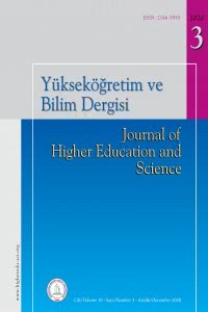Kamu Üniversitelerinde Kayıtlı Öğrencilerin Sosyo-Ekonomik Statüsü Üzerine Bir Araştırma: Şırnak Üniversitesi Örneği
Yükseköğretim, Sosyo-ekonomik statü, Eğitim harcamaları, Fırsat eşitliği
A Research on the Socio-Economic Status of Students Enrolled at State Universities: Sample of Şırnak University
___
- Abbot, A., & Leslie, D. (2004). Recent trends in higher education applications and acceptances. Education Economics, 12(1): 67-86
- Akın F., Şimşek, O., & Erdem, F. (2007). Türkiye’de eğitim sorunu. Toplumsal aktörlerine göre eğitim sorunlarına bakış. Ankara: Türk Eğitim-Sen.
- Aslanargun, E., Bozkurt, S., & Sarıoğlu, S. (2016). Sosyo ekonomik değişkenlerin öğrencilerin akademik başarısı üzerine etkileri. Uşak Üniversitesi Sosyal Bilimler Dergisi, 9(3): 214-234
- Blöndal, S., Field S., & Girouard N. (2002). Investment in human capital through upper-secondary and tertiary education. OECD Economics Studies, 34(1), 41-89. Retrieved from https://ideas. repec.org/a/oec/ecokaa/5lmqcr2k2c7c.html
- Coombs, P., & Hallak, J. (1994). Bir sistem olarak eğitim. Eğitim ekonomisi: Seçilmiş yazılar. (Çev. Y. Kavak, & B. Burgaz). Ankara: Pegem Yayınları
- Çiftçioğlu, N. (2013). Sosyo-ekonomik faktörlerin yükseköğretim talebi üzerine etkileri: Gaziantep ili örneği (Yayınlanmamış yüksek lisans tezi). Hasan Kalyoncu Üniversitesi, Sosyal Bilimler Enstitüsü, Gaziantep.
- Çiftçi, C., & Çağlar, Ç. (2014). Ailelerin sosyo-ekonomik özelliklerinin öğrenci başarısı üzerindeki etkisi: Fakirlik kader midir? International Journal of Human Sciences, 11(2): 155-175
- Ekinci, E., C. (2011). Bazı sosyoekonomik etmenlerin Türkiye’de yükseköğretime katılım üzerindeki etkileri. Eğitim ve Bilim Dergisi, 36(160), 281-297
- Erayman, Y. (2004). Kahramanmaraş Sütçü İmam Üniversitesi öğrencilerinin sosyo-ekonomik yapılarının başarıları üzerine etkisi (Yayınlanmamış yüksek lisans tezi). Kahramanmaraş Sütçü İmam Üniversitesi, Sosyal Bilimler Enstitüsü, Kahramanmaraş.
- Gölpek, F. (2008). Adalet ve etkinlik amaçları bakımından yükseköğretimde finansman politikası: Türkiye örneği (Yayınlanmamış doktora tezi). Uludağ Üniversitesi, Sosyal Bilimler Enstitüsü, Bursa.
- Gölpek, F. (2011). Yükseköğretimin getirileri ve etkinlik sorunu. Atatürk Üniversitesi İktisadi ve İdari Bilimler Fakültesi Dergisi, 25(3-4), 77-95.
- Gölpek, F. (2014). Rate of return to and price of higher education in Turkey: A case study of law faculty. Education and Science, 39(175): 172-182
- Gölpek, F. (2015). Who earnings after four years’ education in Turkey: The society or the individual? Education and Science, 40(177), 19-30.
- Gölpek, F., & Çiftçioğlu, N. (2014). Social-economic factors in demand for higher education: Sample of Gaziantep province. International Journal of Business and Social Science, 5(1), 121-134. Retrieved from https://ijbssnet.com/journals/ Vol_5_No_1_January_2014/15.pdf
- ISSN: 2146-5959
- Yayın Aralığı: Yılda 3 Sayı
- Başlangıç: 2011
- Yayıncı: Bülent Ecevit Üniversitesi (Önceden Zonguldak Karaelmas Üniversitesi)
Tıp Fakültesi Öğrencilerine Verilen İletişim Becerileri Dersinin Yüz Tanıma Testine Etkisi
Mehmet ÜZEL, Zennure ADIGÜZEL ŞAHİN, Selman DEMİRCİ, Gözde GÜLTEKİN, Özlem Serpil ÇAKMAKKAYA, Fatma Güler KAHRAMAN YILDIRIM
Somayyeh RADMARD, Yılmaz SOYSAL
Malzeme Bilimi ve Nano Mühendislik Programının Öğrenme Çıktılarının Analizi
Duygudurum Bağlamında Müzik ve İnsan Sesi
Yükseköğretim Hazırlık Sınıfı Dil Eğitmeni İstihdamına Yönelik Eleştirel Bir Söylem
Yükseköğretim Kurumlarında Akademik Performans Değerlendirmeye İlişkin Akademisyen Görüşleri
Ömer YILMAZ, Salih Paşa MEMİŞOĞLU
Yönetim Bilişim Sistemleri Bölümü Öğretim Programlarının Bilgi Yönetimi Açısından Değerlendirilmesi
Türkay HENKOĞLU, Halise ŞEREFOĞLU
Öğretmen Eğitimcilerinin Öğretme Kavramlarının Haritalandırılması: Fenomenografik Argüman Oluşturmak
Yılmaz SOYSAL, Somayyeh RADMARD
Çinli Doktora Öğrencilerinde Anksiyete ve Anksiyete Kaynakları
